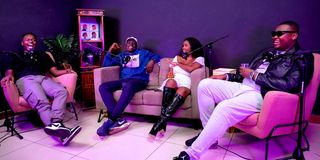The Sheng podcasters on their cut and try journey to glory

The Sandwich Podcast hosts George Nyamita, 23, Tonio Kibet, 25, Joan Melly, 25, and Owen Njuguna, 24, during a studio session in Nairobi.
Owen Njuguna sat absent-mindedly in a law class, his longtime comrade Tonio Kibet attending an engineering class in a different lecture hall, distracted.
At break, the 19 and 20-year-olds (then) made a confession to each other.
They didn’t have the gusto to carry on with their respective studies and so they began to hatch a plan on how to quit school without getting into trouble with their parents.
That’s how The Sandwich Podcast-which last October listed among the 13 podcasts benefiting from Spotify’s Sh12 million seed funding in Africa- was born.
“This was 2019, and to be honest, the studies were hurting us, then Covid-19 happened, occasioning the closure of schools in 2020 and we saw an opportunity not to go back, but we had to have a tangible reason. We had to find an excuse. At the time we were listening to lots of foreign podcasts and that’s how we came up with the idea of starting one,” Njuguna now 24, opens up amid laughter.
The idea was to start a podcast focusing on the daily life experiences and challenges of a 20-year-olds in the city. They would then enlist two more comrades, Joan Melly, 25, and George Nyamita, 23.
As of October 2022, The Sandwich podcast had the most listeners in Kenya according to Spotify’s data ahead of The Messy Inbetween hosted by Murugi and Lydia Mukami, Mantalk.ke by Eli Mwenda and Oscar Koome and Nipe Story by journalist Kevin Mwachiro, all of whom also benefited from the Sh12 million funding.
“Our podcast is three years old now. I think we are the biggest in Kenya in terms of listenership. Total plays since we started recording stands at 1.5 million on Spotify and we are currently at 100 episodes. On Apple Podcast is one million” says Kibet, now 25 and currently moonlighting as Homeboyz Radio presenter.
The first episode, an amateurish one, was shot inside Njuguna’s parents’ servant quarters, the next inside Kibet’s car and the third was hosted inside Njuguna’s ex-girlfriend’s car. All they did was switch on a cheap Lavalier microphone and talk.
That first 30-minute-long episode garnered over 7,000 plays in week one of its release.
“Joe Budden Podcast (of former American rapper) was instrumental in shaping ours. We really felt like we could convert that energy that his podcast had into a Kenyan audience. Like the same things he is doing, we put a Kenyan flair to it, speak Sheng and bring the normal ordinary vibes of how you will always find Kenyans telling their stories. But we focused more on the up and downs of a 20-year-old living in the city, the financial challenges, school life and things like that,” adds Njuguna.
Kibet says this was one of the strategies employed that contributed to the success of The Sandwich Podcast, especially towards amassing a huge listenership.
“Having been diehard of podcasts, we had done our little research and discovered that a lot of podcasts in Kenya catered more to a certain type of audience, much older people.
“There was none that touched on the Gen Zs and so we stepped in to fill the gap. Our topics are relatable to anyone in our age bracket and it’s another reason we have been at the top. I mean you will rarely here someone on a podcast narrate a story of how his phone was stolen in a matatu because many will view it as a non-issue but not to a 20 year old,” Kibet says.
It’s this niche of content that had the podcast gather a legion of fans spreading through word of mouth.
“It wasn’t even about the quality of production because our first episodes were the worst you could possibly ever imagine, but the content was there, that’s what many people liked and so word went around. This niche content is also the reason why we have been able to maintain our listenership,” he xplains.
Another game plan that gave the podcast an edge over the rest was producing only audios.
There was also the issue of the interpersonal chemistry between the four that made the episodes lively, engaging and funny, not forgetting the use of Sheng.
“We did audio podcasting for so long before incorporating video, that we gave our audience a culture habit of listening. This was deliberate, we wanted to set ourselves apart from other Kenyan podcasters which were mostly visuals and as such not so different from vlogs which is what most YouTubers do anyway,” says Kibet.
From their research the duo argues that when it comes to podcast, audios are more powerful than videos because one doesn’t need to watch.
“You could do a whole lot of activities while listening to the audio and we are lucky that many people actually fancied this,” he goes on.
Njuguna and Kibet confess that the long break orchestrated by Covid-19 was indeed a blessing in disguise.
Having spent so much time at home, putting the two Covid-19 years into use by setting up the podcast, made it a little bit easier on them to convince their parents of the new option they had rather than going back to doing law and engineering.
At this point, that was the only focus-not going back to school and having their parents align to their vision.
And when the podcast gained momentum, the focus shifted to how to monetise their new platform.
“Having witnessed Joe Budden land endorsement deals from Spotify among many other brands, we knew we could too make money from ours however we didn’t know-the how,” Kibet confesses.
It took two years for the podcast to generate its first income which was a mere Sh5,000.
Their first deal an agency offered them free studio sessions to record and in return, the crew would “plug them” (advertise their business). Then a radio station approached them but offered to pay them with “exposure”. “They had a budget but didn’t think we deserved to be paid. The third deal is what generated us our first revenue, we marketed an event and got paid Sh10,000,” Njuguna said.
To them, this was a good start, at least at last the podcast was on a path to become self-sustainable.
Gradually, more event’s organisers started reaching out to The Sandwich on recommendations heavily backed by good analytic numbers and it was now time to create a rate card.
“When Kibz (Kibet) drafted our first rate card we all had an argument because we thought he was being over-ambitious. However, we trusted in his insights because he had been in the content creation space long before all of us,” Njuguna reveals.
Not being able to make money early enough, Njuguna places the blame on the lack of knowledge amongst brands on what podcasting is all about.
“In the mind of many brands and corporations, we were influencers, but we are not. We are an alternative media to old media. Thus was the challenge, they couldn’t see the value in paying for adverts on the podcast.”
From pushing events and gigs, it didn’t take long for the Sandwich reputation to supersede its name.
“Our portfolio grew and we were now also pushing new applications that were launching and not so long we landed our first big deal in 2022. Article 19, an international organisation, asked us to do a campaign on voter registration targeting young people, which was basically our demographic (18 to 24-year-olds).”
The Sandwich signed a six-month contract with the non-governmental organisation, which paid them a sum of Sh1.8 million during that period of the campaign gearing towards the 2022 General Election.
This is a project Kibet terms as a success giving glimpse on a few tactics they employed to impress the NGO.
“We had a few tactics up on our sleeves. Other than coming up with interactive engaging honest topics, we came up with a number of Sandwich merchandise. Amidst conversation we would ask listeners to send us pictures of their voter’s card and we would reward them with some of our branded merchandise. It was so generic that you wouldn’t notice that it was an Advert what we call integrated Advert. We never do drop ups like radios,” he says.
Njunguna also believes this was the gig that put The Sandwich out into the corporate world as now many started to see value in their platform and invest in it.
He recalls that it’s around the same time they received an email from Spotify inviting them to a pitch meeting in South Africa.
“The pitch was very simple, demonstrate how you will use the funding they intend to give you to grow the podcast. The seed funding was issued based on how detailed and capturing your proposal was. Imagine someone asking you to explain how you intend to use between 4,000 to 10,000 US dollars (Sh580, 000 – Sh1.5 million)?” Kibet, who made the trip to Johannesburg, explains.
Part of the funding from the streaming platform, which they didn’t disclose, the podcasters invested in building a website that is almost complete, setting up their independent studio, pay our team a stampede from our social media manager, photographer, videographer and also commence organising live podcast shows.
“We were the first to do a live podcast show in the country. We have done three so far and we are currently planning for a fourth one towards the end of the year,”
For a podcast, live shows are another avenue to generate income. In the first live show, they made losses, the second they broke even, the third there was a slight margin.
“It has been a learning adventure on the go. We are now very knowledgeable and building on the success of our third show which we did invest quite a considerable amount from the Spotify funding and our savings, the forth show we are definitely convinced of a good return,” Njuguna says.





